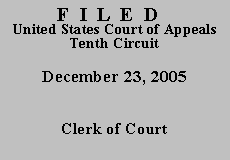

| STANLEY E. JOHNSON, |
|
| v. | |
| JAMES W. HARRISON, |
Federal courts have jurisdiction over habeas corpus petitions brought by individuals convicted by court-martial under 28 U.S.C. § 2241. See Burns v. Wilson, 346 U.S. 137, 139 (1953). Our review, however, is limited. Where the military courts gave "full and fair consideration" to the claims presented in a habeas corpus petition, we will not grant habeas relief "'simply to re-evaluate the evidence.'" Lips v. Commandant, U.S. Disciplinary Barracks, 997 F.2d 808, 811 (10th Cir. 1993) (quoting Burns, 346 U.S. at 142). "When an issue is briefed and argued before a military board of review, we have held that the military tribunal has given the claim fair consideration, even though its opinion summarily disposed of the issue with the mere statement that it did not consider the issue meritorious or requiring discussion." Watson v. McCotter, 782 F.2d 143, 145 (10th Cir. 1986).
We agree with the district court that the military board of review gave full and fair consideration to the issues presented in Mr. Johnson's habeas corpus petition. Mr. Johnson raised two issues before the United States Army Court of Military Review: that he was incompetent at the time of the crime and that there was insufficient evidence to sustain his robbery conviction. With respect to Mr. Johnson's claim that he was incompetent, the Court of Military Review held:
We have carefully considered all of the competent evidence of record in this case and, as appropriate, have taken into account evidentiary factors such as professional qualifications, training, education, opportunity to observe and report, temporal considerations, and similar matters affecting the weight of the evidence. We conclude that, whereas [Mr. Johnson] may have been suffering from a mental disease or defect and may have had a partial mental impairment on the date of the alleged offenses, such impairment was insufficient to absolve him of criminal responsibility for his conduct and actions vis-a-vis the victim or to negate the specific intent elements of the robbery and attempt to murder charges.
A.C.M.R. Mem. Op. 2. The Army Court of Military Review thus fully and fairly considered whether Mr. Johnson was competent when he committed the crime. The Army Court of Military Review also considered and summarily rejected Mr. Johnson's claim that there was insufficient evidence to support his robbery conviction. Accordingly, we will not grant a writ of habeas corpus. For the foregoing reasons, the judgment of the United States District Court for the District of Kansas is AFFIRMED.
Entered for the Court,
Michael W. McConnell
Circuit Judge
*.After examining the briefs and appellate record, this panel has determined unanimously that oral argument would not materially assist in the determination of this appeal. See Fed. R. App. P. 34(a)(2); 10th Cir. R. 34.1(G). This case is therefore submitted without oral argument. This order and judgment is not binding precedent, except under the doctrines of law of the case, res judicata, and collateral estoppel. The court generally disfavors the citation of orders and judgments; nevertheless, an order and judgment may be cited under the terms and conditions of 10th Cir. R. 36.3.